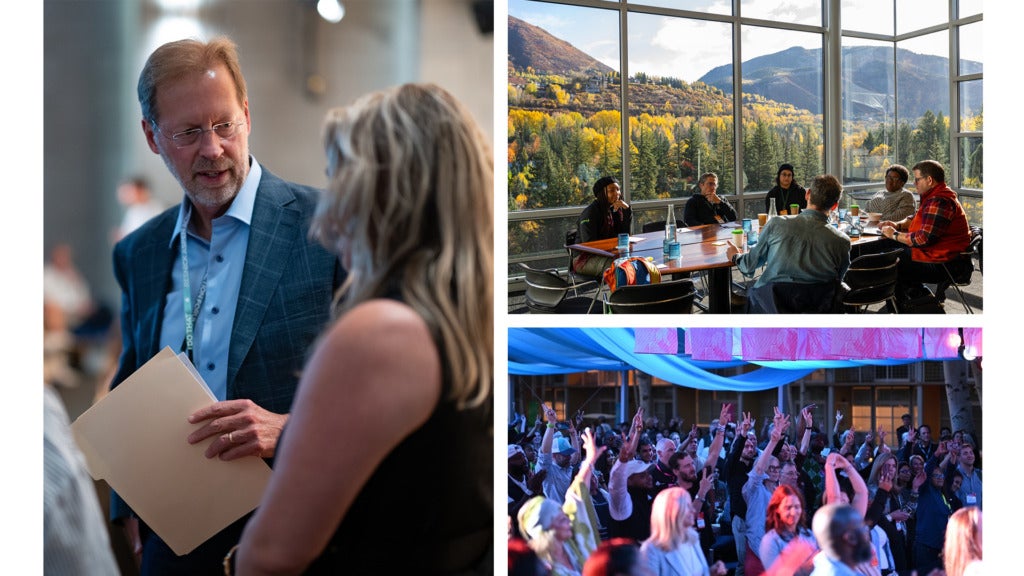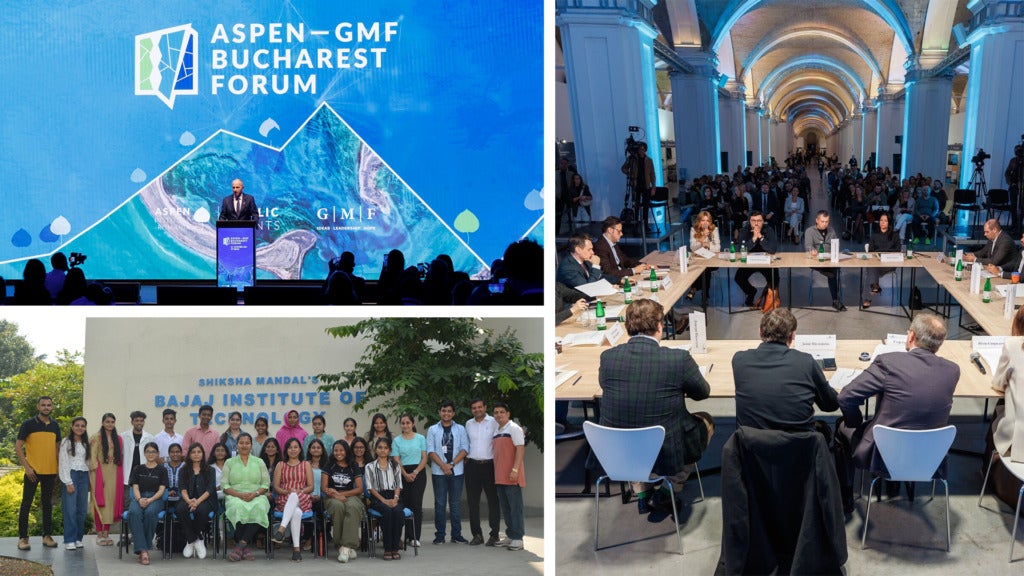In our In Focus: Igniting Leadership series, we’re looking closely at the “why” and “how” of effective leadership. We’ll explore the work and impact of the Aspen Institute’s many leadership programs, examine the Institute’s founding ideals of, and aspirations for, leadership, and feature the leaders who are building new possibilities for a better world.
A version of this piece originally appeared in “The Necessity of Character: Moral Formation and Leadership in Our Time” edited by James Mumford & Ryan S. Olson.
![]()
“It is always darkest just before it’s totally black.”
A clever quip, from the late Republican presidential nominee John McCain, that perfectly captures the mood of many in these precarious times. At both the global and the local levels, the clouds that look most ominous also seem to be converging.
But “totally black”? Are we truly fated to meet that destiny? Or, might Dr. King be closer to the mark? “Darkness cannot drive out darkness; only light can do that.”
One source of light, I think, is highly principled and highly effective leaders who can make a difference in the world precisely because they think, work, and collaborate differently—leaders who can come together and dream up new solutions to seemingly intractable problems. Cultivating this kind of leadership is essential for the long-term health of our society and, indeed, all open societies.
Our country needs leaders—and new approaches to leadership. At the Aspen Institute, we understand that leadership isn’t defined by a title; it’s an action. True leadership can come from anywhere, and, thus, must be accessible and inclusive—a social, even communal, pursuit.
In short, we need more effective leaders, and we need more people stepping up to the challenge of leadership. We need leaders with diverse skills, from varied backgrounds and sectors, who are all willing to give their all to make a difference—each in their own unique way. As our late colleague Lola Adedokun wisely said: “Leadership is cause; everything else is effect.”

At Aspen Institute, we have developed an outsized capacity and belief in the power of fellowships: cohort-based programs that situate leadership as a community experience—one that thrives on the power of shared learning, dialogue, and action.
While everyone has the potential to lead, not everyone has the opportunity. We may wish that transformative leaders—people of character and influence—could simply emerge naturally, like wildflowers in the desert. But the truth is, we need environments rich in resources to nurture those capable of inspiring others. We need healthy ecosystems of support that provide the help leaders need to grow throughout their lives of evolving service. In such environments, leaders can be mentored, challenged, and celebrated. At their best, these ecosystems uphold honesty, integrity, service, and sacrifice as timeless virtues essential to true leadership.
Tasked with “igniting human potential to build understanding and create new possibilities for a better world,” we at the Aspen Institute are providing those resource rich environments, cultivating action-biasing leaders and leadership through more than 60 programs, 600+ employees, and some 75,000 participants in many countries.
Foundations of Leadership Grounded in Humanity
It all started with our mid-century founder, the Chicago industrialist Walter Paepcke, who believed, as we do still, that the world urgently needed “humanistic leaders who valued reason, knowledge, dialogue, culture, and moral inquiry.” Paepcke set out to organize, for three weeks in the summer of 1949, a global summit for 3,000 people in the remote mountain town of Aspen, Colorado. The focus was to explore how the principles of humanism might inform current-day leadership and problem-solving, thus mitigating what Paepcke saw as an enervating cultural pessimism in the post-war, late modern West.
Mere months later, Paepcke and his founding trustees established an institute “dedicated to the greatness of the human spirit and the worlds of man.” Why? Because “in a world which almost worships science and technology,” the founders insisted, “we must rediscover the moral and spiritual truths which enable men to control science and all of its machinery.” And the key to all this? The key was leadership. Paepcke’s first move after the summer conference was to commission University of Chicago professor Mortimer Adler to curate a twelve-day leadership course.

We’ve recognized that leadership is rooted in both human values and local realities. In turn, our ecosystem of leadership development becomes ever richer through our global expansion, primarily through our International Partners.
Thousands of leaders have taken the Aspen Executive Seminar since 1950. From the outset, sensing just how influential commerce would prove in post-war America, Paepcke and Adler were adamant that the invitation must be extended to business executives. The default assumption within the design of the course? If you want to lead, you must understand both your own core values as well as those that animate other people.
Across the ensuing two decades, the success of the Executive Seminar led the Institute to start a
Building a Thriving, Interconnected Community of Leaders
Building on this foundation, the Aspen Institute has since evolved and expanded our understanding of how we can best advance leadership and serve leaders over the last several decades.
First: we’ve recognized that leadership can be both demanding and isolating; leadership is lonely. Leaders need transformative spaces to grow in community, to find support, and to build connections that can sustain them and their change-making across different stages of their careers. As such, we have developed an outsized capacity and belief in the power of fellowships: cohort-based programs that situates leadership as a community experience—one that thrives on the power of shared learning, dialogue, and action. For some, these fellowships offer the chance to clarify core beliefs and purposes, anchoring them as they step into leadership. Other fellowships, such as those focused on community college presidents or state officials, enable leaders in public service to gain essential knowledge and networks while seeking solutions to challenges like poverty at the institutional and systemic levels. As a result, our alumni are empowered to lead with greater clarity, resilience, and a supportive network that amplifies their vision and impact, regardless of the field in which they serve.

We are committed to broadening the definitions of leadership—especially by engaging with youth and young changemakers—which ensures we’re fostering multi-generational leadership that represents the wide range of perspectives needed to tackle today’s most complex issues.
Second: we’ve recognized that leadership is rooted in both human values and local realities. In turn, our ecosystem of leadership development becomes ever richer through our global expansion, primarily through our International Partners. Since the founding of our first partner, Aspen Institute Germany in 1974, our network of thirteen independently run partner institutes has extended Aspen’s core principles to new contexts, with presences in Colombia, India, Spain, Japan, and Ukraine, to name a few. Each location facilitates Socratic-style discussions, reflections on shared values, and collaborative problem-solving, grounded in the understanding that effective leadership must be situated within local cultural contexts, yet informed by universal values.
Finally: we are committed to broadening the definitions of leadership—especially by engaging with youth and young changemakers—which ensures we’re fostering multi-generational leadership that represents the wide range of perspectives needed to tackle today’s most complex issues. The launch of our new Center For Rising Generations will ensure that civil dialogue, civic engagement, and leadership development become a predictable part of the journey to adulthood in our society and around the world.
Since our founding, the Aspen Institute has viewed leadership as a driving force of societal progress, building an ecosystem of support that encourages leaders to connect, grow, and thrive within a global community. Over the past 75 years, we have identified, convened, challenged, and supported thousands of leaders from all walks of life, building a reputation as one of the world’s foremost hubs for values-driven and practice-based leadership. As we look toward our next 75 years, we are inspired to connect the unique networks of leaders within our ecosystem in new and dynamic ways. Our goal is to amplify the impact of our leadership community, creating pathways for collaboration that transcend borders, generations, and viewpoints. By linking and leveraging our leadership assets, we will nurture a thriving, trust-based global network of leaders who can shape a brighter, more inclusive future—leaders who connect, grow, and spark change across every stage of their lives and careers.
![]()
—–
Through our In Focus Series on Igniting Leadership, you will have the opportunity to share what we are learning about fostering leaders and leadership. Follow along by signing up for our exclusive “Igniting Leadership” email series for insights into Aspen’s programs, and connect with us on YouTube, LinkedIn, and Instagram to stay updated on events, insights, and new content.

